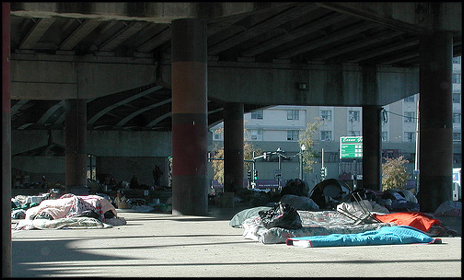
Forensic psychologist Karen Franklin says that the majority of sex offenses are committed by men without criminal records, so no matter how stringently those with records are controlled, these crimes will continue. And most convicted sex offenders are never arrested for a second sex crime. A very small minority of ex-offenders, in the area of 15%, are the ones who need watching. With the rest, it’s a waste of time an energy, and actually causes more problems.
We talked about Jessica’s Law in California and similar measures in other states, requiring that ex-offenders not live within certain distances of schools, parks, and other places where children gather; and the unforeseen results that have led to even more problems, such as an increase in homelessness, and a less safe environment.
As Franklin puts it,
Time and time again, here’s the way the story goes:
1. An exceedingly rare but highly troublesome event occurs.
2. A knee-jerk scramble ensues to find the cause and affix blame.
3. Existing laws are impulsively altered.
4. Unintended consequences ensue, most of them harmful.
Another issue is that, in some places, even if their sentence is served, inmates cannot be let out without giving an address, which of course many do not have. Earlier this year in Wisconsin, an appeals court decided that homeless sex offenders who leave prison are not obligated to do this, acknowledging that the requirement to register an address just can’t be met by a released prisoner with nowhere to go, and no prospects.
The same question came up in Alabama, where Thornal Lee Adams was being punished, in violation of the Constitution, for being homeless. Adams won in court, and his attorney David Schoen is quoted as saying the decision was:
[…] stunning in its recognition of the unique hardships that poverty places on members of our society, and it speaks in the strongest terms possible against penalizing that status through the criminal law.
A couple of years back, a Florida judge made national news by ordering several homeless sex offenders to live beneath a highway bridge. Their registration address was the Julia Tuttle Causeway, and they were ordered to stay under there nightly from 10 PM to 6 AM. The futility can easily be seen. Has anyone proven that assaults on children never take place during daylight?
One of those five men, Kevin Morales, after serving his sentence, had recovered his life to the point of having a job, a car, and an apartment, which he was forced to leave because of the residency restriction laws. He petitioned the judge to go back to jail, where at least there were no rats, but was refused. (His current address is listed as “Transient.”)
In California and some other states, in addition to strict residency rules, ex-offenders have to wear Global Positioning System ankle bracelets for the rest of their lives. One might ask, if GPS monitors are required, aren’t the restrictions on residence pretty much redundant?
Why isn’t it enough to just settle for having the ankle bracelets tracked in real time? It would not matter if the nearest child was 20 feet away, as long as the permitted radius was 10 feet. If the authorities are going to make use of those devices anyway, why not trust the devices to do their job? And why not expand them to other areas? When Enron’s Andy Fastow gets out of prison, for instance, it might be useful to keep an eye on him.
As it turns out, the GPS units need to be recharged periodically. Someone living under a bridge, or even in a homeless shelter, can’t get access to electricity for the required recharging of the GPS unit. Functional GPS monitors would make the probability of being caught and proven guilty about 100%.
John Simerman reports that even George Runner, the senator who got Jessica’s Law passed, says that he’s never heard of a homeless parolee with a GPS monitor being a repeat offender. So, by his own logic, he ought to see that having these men stabilized in places where their anklets can be recharged is a good idea. You’d think he would see the advantage of finding them places to live. But, Senator Runner says,
I’m sure that’s a personal hassle for them, but that’s not my concern.
Well, it should be of concern. When any kind of menacing person is homeless, including sex offenders, they can’t be kept track of, or located for questioning if need be. This makes society less safe overall. There are many compelling reasons not to go all medieval over ex-offenders.
Reactions?
Source: “Sex offender fallout hitting unrelated laws,” In the News: 05/27/10
Source: “Court: Sex offender notification law can’t apply to homeless,” PrisonTalk, 11/07/10
Source: “Where Can You Live in Florida if You Are a Registered Sex Offender?,” JusticeFlorida.com, 08/22/08
Source: “Court challenges mount against sex offender law,” Mercury News.com, 12/21/10
Image by Editor B (Bart Everson), used under its Creative Commons license.
